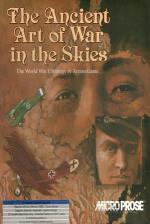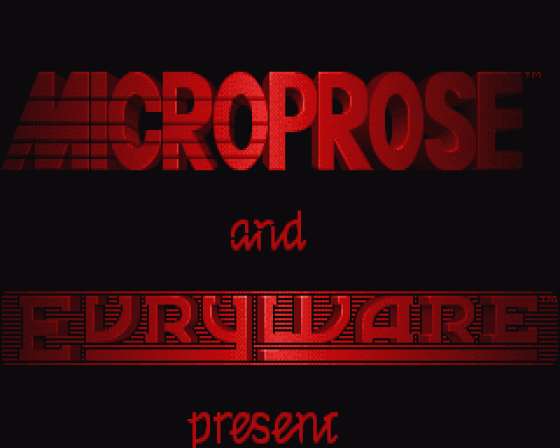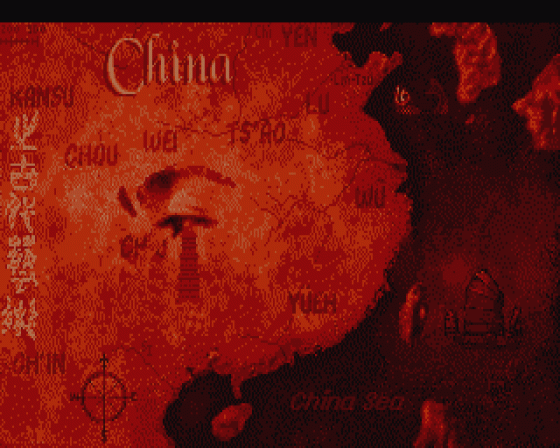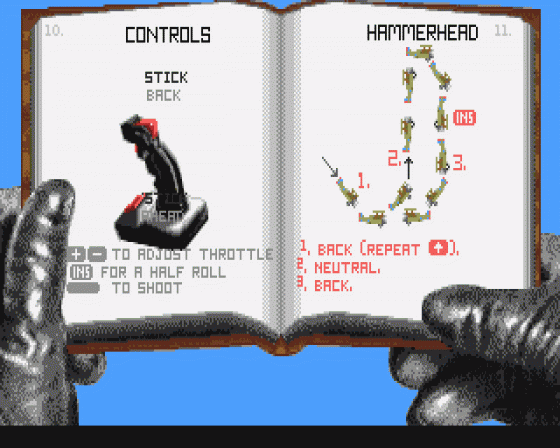
ST Format
 1st October 1993
1st October 1993
Categories: Review: Software
Author: Rob Mead
Publisher: Microprose
Machine: Atari ST
Published in ST Format #50
What has Chinese philosophy got to do with pumping enemy airplanes full of lead? Rob "Mao Tse Tung" Mead decides it's time to find out...
Ancient Art Of War In The Skies
The Chinese are a clever bunch. When they're not inventing fireworks, building Great Walls or whipping up portions of egg foo yung, they write epic books about the conduct of humans in battle.
Ancient Arts Of War In The Skies is a strategy and action game based on the works of Chinese general Sun Tsu. 2,500 years ago he wrote the definitive guide to battle strategy - the 'Ancient Arts of War' - which is still used by military commanders to this day. MicroProse's version of this great book is set in the skies above Europe during World War One. You play the commander of either the Allied or Central Power's air forces over 54 campaigns covering the main historical battles.
The majority of the action takes place over a highly detailed map of the battlefield which shows both Allied and Central Power's Forces. The map shows each side's respective defences - airfields, cities, factories and so on - as well as the battle front where the land battle is taking place. You're given a limited number of bombers and fighters to play with and have to decide which targets you're going to attack, while defending your own bases. You can select a maximum of three bombers and three fighters to take off on a sortie over enemy lines which you select by placing a series of waypoints. Because early aircraft had a limited range and climbing capabilities, you have to take distance and natural obstacles - like mountain ranges - into account when planning your route. Once you've decided which aircraft are going to go where, it's time to set the ball rolling... and so does your ST-controlled opponent.
Wholescale Destruction
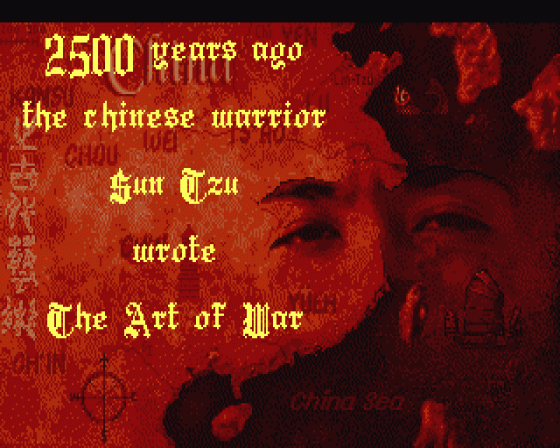
As your bombers and fighters head towards their target all kinds of things can happen - you can come under attack from enemy aircraft, your aifrields can be destroyed so you can't land after your raid, or your capital city can be destroyed forcing you to surrender. Defence is often the best offence, especially when the enemy has overwhelming superiority in terms of aircraft and firepower. You can tell how you're doing in the air by the frequent messages which appear on-screen. Your troops also advance or retreat depending on how well your strategy is progressing.
However, there's more to this game than just sitting around watching the battle upfold on a digitised map. You can pile in there and take control of the conflict at any point by taking part in dogfights or bombing runs. The dogfight sequence pits fighter against fighter or fighter against bomber with you and your opponent each trying to outwit each other with daring manoeuvres and plenty of canvas-shredding gunfire. To make things more complicated your own fighters can inadvertently shoot each other during the melee and your guns can jam at crucial moments - these and other combat options can be disabled if you wish. The other thing to remember is there are no parachutes. Your little chaps can't ejector-seat to safety when they get in trouble, they just die. Sometimes cutting and running is the only alternative.
The bombing sequences are just as much fun which have you hanging out over a gaping hole in your aircraft's floor. You have to fly over selected targets and pick just the right moment to release your deadly cargo - there are no Norden bomb sights to help you, you just have to let your bombs go when you think they've got the best chance of hitting your target. At any time during a raid you can call up a reconnaissance photo showing which objectives you knocked out. It's not all plain-sailing, though - you're constantly under attack from enemy anti-aircraft fire and your plane can literally disintegrate at any moment.
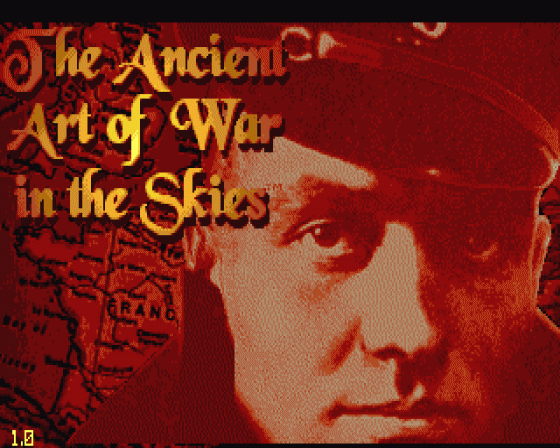
One of the best options in the game is the ability to choose from eight different commanders - Lord Kitchener, General Foch, Kaiser Wilheim, Helmut von Spike, Baron Richthofen, Captain Fonck, Major Mannock and Sun Tsu himself. You pick one to fight for your side and one for your ST. Because each commander has different battle strategies, there's an endless number of variations you can have when playing the 54 campaigns. Alternatively, you can accept the default commanders your ST picks for you.
If 54 infinitely variable campaigns aren't enough for you, Ancient Arts also has a Campaign Editor, so you can edit existing battle scenarios or create your own. The editor's a doddle to use - you just scroll around a bare map placing enemy and friendly pieces, generating aircraft squadrons and adorning the battlefield with mountains, trees and rivers.
Trench Pudding Anyone?
Most strategy games are boring affairs which weigh you down with acres of detail and thick manuals. But not this time. Ancient Arts is a highly enjoyable and addictive gameplaying experience. You know you're onto a winner when you see the sumptuous opening pics of Sopwith Camels, the Red Baron and atmospheric silhouettes of trench warfare. Once the gameplay kicks off you discover - unusually for a strategy game - that zipping around the map screens is incredibly easy and pleasurable to do - selecting waypoints and manoeuvering your forces is a doddle, leaving you plenty of time to get on with your battle plan.
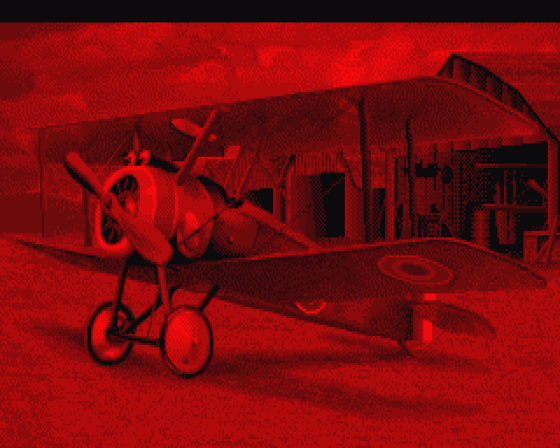
One thing's for sure, you're not going to be flicking through the Technical Supplement every five seconds because you can't remember how to set a waypoint. The amount of detail is also impressive - destroyed targets start to rebuild themselves, you see planes climbing after take-off and you get a bird's-eye view of the ground battle thanks to plenty of impressive explosions. If you're a war-gaming purist, you're going to hate this.
Another surprise is with the combat sequences. When MicroProse say they've come up with an arcade game you expect to be confronted with an F-19-style cockpit view of the action, not cartoon planes flying from left to right. But that's exactly what you get. It's hard not to laugh at first, but you soon realise the little plane sprites are actually very well-animated and highly manoeuvrable. Enemy and friendly aircraft spiral in and out of the screen view convincingly and you can try all kinds of acrobatic manoeuvres. It's just like taking part in a real dogfight, especially when you see the miniature pilots plummet to earth when their planes explode around them.
Ancient Arts can be controlled by mouse, joystick or keyboard, although a combination of mouse and keyboard moves is the best option - the mouse can be used for scrolling around the map screen, while the keyboard is best for controlling the aircraft in the arcade sequences. Graphically, the map screens are highly detailed and you get a realistic bird's-eye perspective of the unfolding conflict. The combat and dogfight sequences are equally impressive with slick scrolling and some smooth animation. Surprisingly, the sound effects measure up too, with a realistically tinny clatter from the machine guns and some ear-shattering explosions, the chip music's pretty catchy as well.
Verdict
At last, a war simulation which you don't need a degree in Advanced Physics to play. Ancient Arts is an original and addictive approach to a genre which is all too often bogged down in tedious manoeuvring and unnecessary attention to detail. The combat sequences are simplistic, but highly effective while the strategy element is rewarding enough to tempt the most sceptical shoot-'em-up addict.
Highs
- Addictive mix of strategy and arcade elements.
Lows
- Really needs a hard drive.

